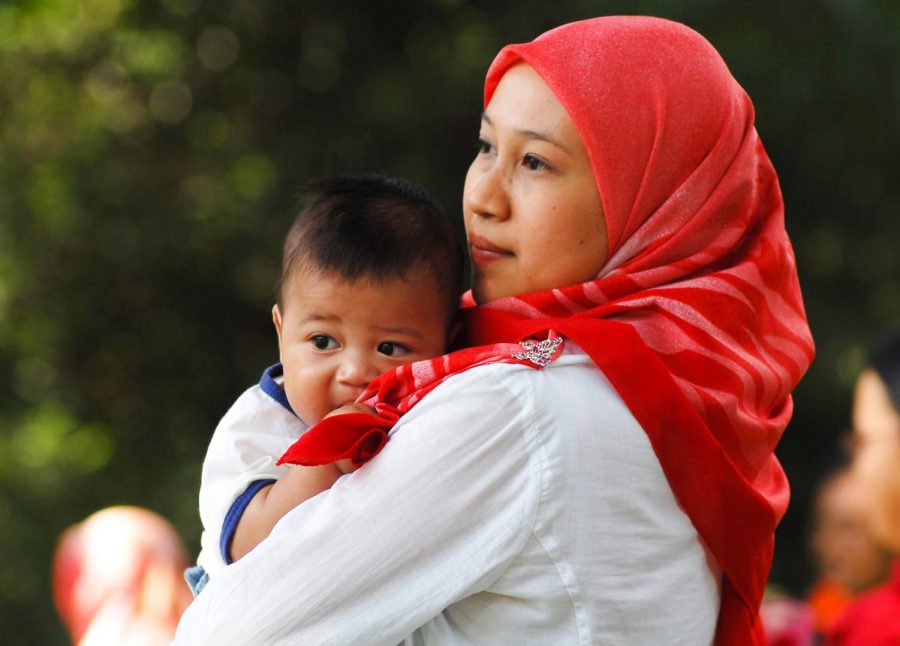Let cultures decide ‘appropriation’ themselves
It isn’t up to white people to decide what is, isn’t positive use of individual’s cultural traditions
Headscarves are present in many cultures and religions, but the hijab, worn by Muslim women, has garnered criticism in America. The Muslim Students Association offered non-Muslim students the opportunity to try one on during Islamic Awareness Week.
April 9, 2018
Last week, WSU celebrated Islamic Awareness Week with guest speakers, events and support across campus. The Muslim Student Association hosted a variety of functions, ranging from a flower carnival to a movie night.
I walked by posters hung all over campus with the featured event “Try on a Scarf Tuesday.” I turned to my friend and asked, “Isn’t that cultural appropriation?” He looked at me with wide eyes. Uh oh, I had uttered the dreaded phrase “cultural appropriation.”
As a white woman, I decided not to speculate further on what was or wasn’t appropriation, but to ask those who are Muslim how they felt about hosting this event.
MSA member Heba Alzan explained that wearing a headscarf is not about exclusion.
“When I encounter some discrimination or misunderstanding, I think that it is my duty to fix the world of even a little bit of misconception,” Alzan said, “especially about why I’m wearing a scarf.”
She said wearing a headscarf is not meant to separate herself from other cultures. She believes making a hijab exclusive for only those who are Muslim makes the practice of wearing a headscarf scarier and more confusing.
“First of all, we want you to know why we do this,” Alzan said. “The other thing is that we want you to try it just for fun. To see and to feel something as I am feeling. To try something different.”
All this made me realize that perhaps I was putting labels of cultural appropriation where they didn’t need to be. I had attempted to be a white savior during an event that obviously did not need any saving.
This isn’t the first time this has happened. Speedy Gonzales is a great example of a white population deciding what was best for a minority group.
According to an interview by Fox News, the animated character Speedy Gonzales was taken off the air because of Cartoon Network’s fear that the mouse was too much of a culturally appropriated Mexican stereotype.
Despite this, Speedy Gonzales was well-loved in Latin America. The League of United Latin American Citizens felt this animated character was a “cultural icon” on Cartoon Network. Petitions were signed for the little mouse to come back to television.
In 2002, Speedy Gonzales reappeared to much controversy and celebration by Mexican-Americans across the nation.
Whether it’s cartoon characters or headscarves, it’s not OK to tell someone of another culture what is or is not appropriation.
MSA member Muad Saleh spoke about the problems that arise when people outside of a culture decide what is or is not appropriation.
Saleh encourages people to experience parts of Islamic culture as long as they don’t claim Islamic traditions as their own original ideas.
“As for the headscarf thing, it’s fine for anyone to wear it,” Saleh said. “If someone is doing it as a joke, then that is different. It depends on your intentions.”
Claiming that something is cultural appropriation can sometimes be an excuse to not include diversity.
I was too nervous to try on a headscarf in case I was appropriating a culture. If this event had been cancelled because of this fear, I would have never gotten the chance to experience an Islamic tradition. I would have stayed in my own little bubble of complacent whiteness.
Instead of excluding activities that might be appropriation, we should have real conversations with people of these cultures to create honest representations and experiences.
The goal of our nation shouldn’t be to hinder the sharing of traditions between cultures for fear of being offensive. It should be inclusion of underrepresented opinions and traditions in appropriate ways.
Don’t be afraid of the phrase “cultural appropriation.” Actually listen to those who aren’t like you, and maybe the term won’t be so scary.









